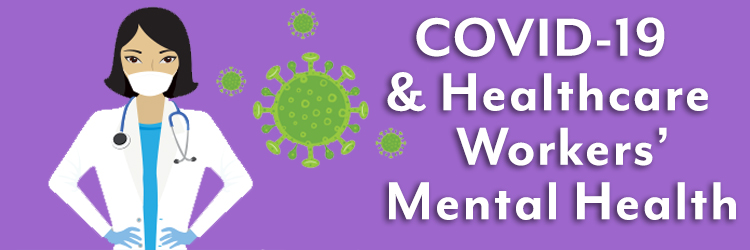[vc_row][vc_column][vc_column_text]While many people are staying home, healthcare workers still have to go to work every day. Many, if not most, are working without proper protective gear. When they do have N95 masks—which are supposed to be for one-time use—they are told to re-use the same one every day. Medical professionals who have never worked in Emergency Medicine are being asked to treat patients with COVID-19 in emergency situations.
Some healthcare workers are feeling guilt about potentially exposing their families, fear of contracting the virus, and grief in watching their patients and possibly co-workers die. One-third of physicians report grief in response to the death of a patient. Because COVID-19 is so contagious, some medical professionals have consistently had to turn away people who want to see their dying loved ones.
Some are struggling with feelings of helplessness, as there is no cure for COVID-19 and a lot we don’t know. Physicians on the frontlines have had to learn as they go, a stressful way to do their jobs on any day, but with even higher stakes.
It’ll be a while before we know the full toll on healthcare workers’ mental health. But a study of medical professionals treating people with COVID-19 in China found that 50.4% had symptoms of depression, 44.6% had symptoms of anxiety, and 71.5% felt distress.
Medical professionals already have a hard job. Long before this crisis, they had high rates of Substance Use and Mental Health Disorders. Some of the statistics from before COVID-19: 1 in 6 surgeons have symptoms of an Alcohol Use Disorder. More than 20% of Emergency Medicine workers suffer from PTSD. 1 in 10 physicians and 1 in 5 nurses will develop a Substance Use Disorder during their careers.
It isn’t only healthcare workers who directly treat people with COVID-19, or work in hospitals, who are having a difficult time. Many medical professionals working in outpatient facilities still have to go to work every day. They have to treat each patient like they might have the virus. Many are scared too. I live and am in a relationship with one of these people. I see the toll it takes on both the person and those closest to them.
High levels of stress make people more vulnerable to Substance Use Disorders. We should be ready for a surge of addiction and mental health crises in our medical professionals—and be more equipped to handle it than we have been with protective gear. We have failed our healthcare professionals. But we can still give them high-quality care when they are likely to be in need.
The good news is that medical professionals respond well to treatment. 74-90% of healthcare workers in treatment for Substance Use Disorders remain abstinent. If you know someone working in healthcare, check in on them. Everyone can use support right now, especially healthcare professionals, grocery store workers, and others on the frontlines.
If you or someone you love is a healthcare worker struggling with a substance use or mental health disorder, there is hope. TruHealing Centers is open and here for you. We are using third-party, hospital-grade sanitation to make sure our facilities are safe for those who need treatment during this time. At our recovery centers across the country, we will help you build the skills to thrive in long-term recovery. Call an admissions specialist at 410-593-0005.[/vc_column_text][/vc_column][/vc_row]









